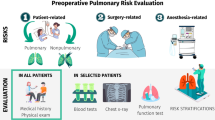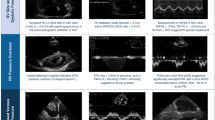Abstract
A 75-year-old previously healthy man presented for elective resection of rectal cancer under general anesthesia. Six days before the operation, he had a high-grade fever, and elevated leukocyte count and C-reactive protein concentration, but this was resolved by an intravenous antibiotic. His condition was well controlled before the operation. Soon after the operation started, severe hypoxemia emerged, with low arterial pressure. Fiberoptic bronchoscopy demonstrated a massive amount of plasma-like edema fluid; the total amount of suctioned fluid was approximately 800 ml at the end of the surgery. This acute pulmonary edema appeared to be due to increased permeability rather than pulmonary congestion as indicated by chest radiography, pulmonary artery occlusion pressure, echocardiogram, and the protein-rich edema fluid. Elevated concentrations of the proinflammatory cytokines, interleukin (IL)-6 and IL-8, in both plasma and the pulmonary edema fluid, suggested a possible role of systemic and pulmonary inflammation in the development of this acute pulmonary capillary leak. According to the “two-hit” hypothesis, the bacterial infection preceding the operation may have primed the immune cells, and the following surgical stress may have then triggered rapid progression of acute respiratory distress syndrome. We should keep in mind that, especially following sepsis, sudden massive pulmonary capillary leak can occur during elective surgery, even though the patient’s condition is well controlled.
Similar content being viewed by others
References
Ware LB, Matthay MA (2000) The acute respiratory distress syndrome. N Engl J Med 342:1334–1349
Miller EJ, Cohen AB, Nagao S, Griffith D, Maunder RJ, Martin TR, Weiner-Kronish JP, Sticherling M, Christophers E, Matthay MA (1992) Elevated levels of NAP-1/interleukin-8 are present in the airspaces of patients with the adult respiratory distress syndrome and are associated with increased mortality. Am Rev Respir Dis 146:427–432
Chollet-Martin S, Montravers P, Gibert C, Elbim C, Desmants JM, Fagoh JY, Gougerot-Pocidalo MA (1993) High levels of interleukin-8 in the blood and alveolar spaces of patients with pneumonia and adult respiratory distress syndrome. Infect Immun 61:4553–4559
Meduri GU, Kohler G, Headley S, Tolley E, Stentz F, Postlethwaite A (1995) Inflammatory cytokines in the BAL of patients with ARDS. Persistent elevation over time predicts poor outcome. Chest 108:1303–1314
Miller EJ, Cohen AB, Matthay MA (1996) Increased interleukin-8 concentrations in the pulmonary edema fluid of patients with acute respiratory distress syndrome from sepsis. Crit Care Med 24:1448–1454
Schütte H, Lohmeyer J, Rosseau S, Ziegler S, Siebert C, Kielisch H, Pralle H, Grimminger F, Morr H, Seeger W (1996) Bronchoalveolar and systemic cytokine profiles in patients with ARDS, severe pneumonia and cardiogenic pulmonary oedema. Eur Respir J 9:1858–1867
Luis M, Ayuso A, Martinez G, Souto M, Ortells J (1999) Intraoperative respiratory failure in a patient after treatment with bleomycin: previous and current intraoperative exposure to 50% oxygen. Eur J Anaesthsiol 16:66–68
Dai MS, Ho CL, Chen YC, Kao WY, Chao TY (2000) Acute respiratory distress syndrome following intrathecal methotrexate administration: a case report and review of literature. Ann Hematol 79:696–699
Vucicevic Z, Suskovic T (1997) Acute respiratory distress syndrome after aprotinin infusion. Ann Pharmacother 31:429–432
Mertes PM, Laxenaire MC, Alla F (2003) Groupe d’Etudes des Reactions Anaphylactoides Peranesthesiques. Anaphylactic and anaphylactoid reactions occurring during anesthesia in France in 1999–2000. Anesthesiology 99:536–545
Ng A, Smith G (2001) Gastroesophageal reflux and aspiration of gastric contents in anesthetic practice. Anesth Analg 93: 494–513
Salzer WL, McCall CE (1990) Primed stimulation of isolated perfused rabbit lung by endotoxin and platelet activating factor induces enhanced production of thromboxane and lung injury. J Clin Invest 85:1135–1143
Rabinovici R, Bugelski PJ, Esser KM, Hillegass LM, Vernick J, Feuerstein G (1993) ARDS-like lung injury produced by endotoxin in platelet-activating factor-primed rats. J Appl Physiol 74:1791–1802
Looney MR, Gropper MA, Matthay MA (2004) Transfusionrelated acute lung injury: a review. Chest 126:249–258
Nakazawa K, Narumi Y, Ishikawa S, Yokoyama K, Nishikage T, Nagai K, Kawano T, Makita K (2004) Effect of prostaglandin E1 on inflammatory responses and gas exchange in patients undergoing surgery for oesophageal cancer. Br J Anaesth 93:199–203
Kobayashi A, Hashimoto S, Kooguchi K, Kitamura Y, Onodera H, Urata Y, Ashihara T (1998) Expression of inducible nitric oxide synthase and inflammatory cytokines in alveolar macrophages of ARDS following sepsis. Chest 113:1632–1639
Author information
Authors and Affiliations
About this article
Cite this article
Ohmi, S., Takei, T., Habuka, K. et al. Acute pulmonary capillary leak syndrome during elective surgery under general anesthesia. J Anesth 22, 77–80 (2008). https://doi.org/10.1007/s00540-007-0581-3
Received:
Accepted:
Published:
Issue Date:
DOI: https://doi.org/10.1007/s00540-007-0581-3




